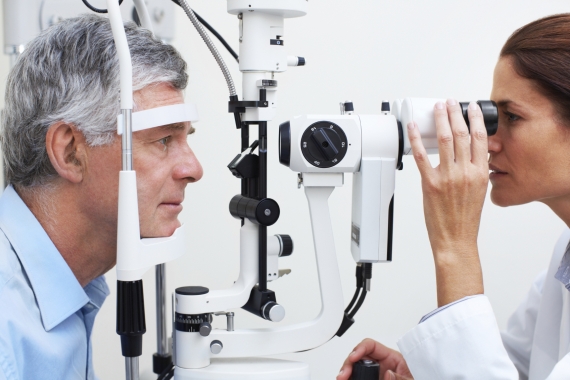Diabetic Retinopathy Symptoms
If you have diabetes, don’t wait for vision loss to occur. Diabetic retinopathy often has no symptoms but is responsible for 12,000 to 24,000 new cases of blindness every year in the U.S. A comprehensive dilated eye exam at Elmquist Eye Group can help preserve your vision before serious damage is done to your retina.
Elmquist Eye Group’s founder, E. Trevor Elmquist, DO, is one of America’s Top Doctors in ophthalmology. He is a board certified ophthalmologist and a fellow of the American Academy of Ophthalmology who earned his medical degree from the University of Health Sciences College of Osteopathic Medicine in Kansas City, Missouri.
 His partner, Kate Wagner, OD, and his associate, Nina Burt, OD, are board certified optometrists who provide comprehensive eye care services. With state-of-the-art facilities, the Elmquist team is committed to providing all patients with outstanding treatment. They are specially trained in diabetic eye diseases and can evaluate and recommend treatments that may prevent those diseases from progressing.
His partner, Kate Wagner, OD, and his associate, Nina Burt, OD, are board certified optometrists who provide comprehensive eye care services. With state-of-the-art facilities, the Elmquist team is committed to providing all patients with outstanding treatment. They are specially trained in diabetic eye diseases and can evaluate and recommend treatments that may prevent those diseases from progressing.
Diabetes and Your Eyes
Diabetes interferes with the body’s ability to use and store sugar, which can cause many health problems, including heart disease, stroke and kidney failure. High blood sugar can also damage the eyes and lead to blindness.
About Diabetic Retinopathy
One common condition is called diabetic retinopathy. It affects the blood vessels in the retina, the sensitive tissue at the back of the eye that responds to light and usually affects both eyes. If you have diabetic retinopathy, you may not notice any symptoms or vision loss until severe damage has been done.
Diabetic Retinopathy Symptoms
In the early stages of diabetic retinopathy, there are often no symptoms or warning signs. You may, however, notice one or more of the following problems:
- Blurry vision and slow loss of vision over time
- Floaters
- Shadows or dark spots in the center of your vision
- Difficulty seeing well at night
How is Diabetic Retinopathy Diagnosed?
Diabetic retinopathy is diagnosed with a comprehensive dilated eye exam. It requires that your pupils be dilated, which allows your eye doctor to view the inside of your eye. Once dilated, we examine each eye with a special magnifying lens that provides a clear view of important tissues at the back of the eye, including the retina, the macula, and the optic nerve.
A related complication called diabetic macular edema, which can also lead to significant vision loss, can be detected with a scan of the macula called Optical Coherence Tomography (OCT). This scanning device is available in Elmquist Eye Group’s Fort Myers and Cape Coral offices and is used to further evaluate patients with diabetic retinopathy.
If you have diabetes, don’t wait until you experience problems with your vision. Have a dilated diabetic eye exam at least once a year so that your ophthalmologist can watch for diabetic retinopathy and other complications. When diagnosed in the early stages, there are more treatment options available.
Can Diabetic Retinopathy Be Prevented?
Diabetic retinopathy and the vision loss it causes can be prevented by strictly controlling your blood sugar levels and blood pressure through diet, exercise, and medications. Better control over your blood sugar will reduce the likelihood of developing diabetic retinopathy or prevent it from getting worse.
Your eye health is important to us at Elmquist Eye Group. If you think you are experiencing symptoms of diabetic retinopathy, schedule an eye exam today by calling us at (239) 936-2020. We offer the best team of eye doctors in Lee County to provide you with individualized care and help prevent vision loss.
